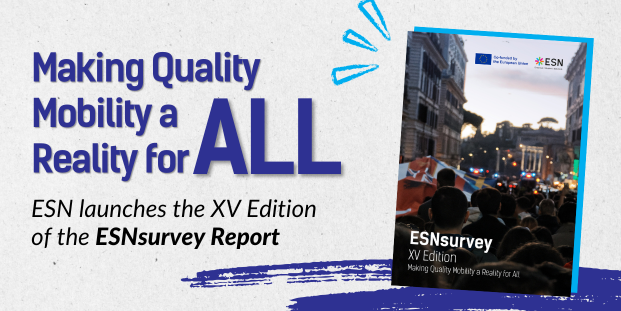
The Erasmus Student Network (ESN) launched the Final Report on the XV ESNsurvey, marking the flagship research project’s 15th edition. Titled “Making Quality Mobility a Reality for All”, the ESNsurvey collected approximately 23,000 responses: 17,855 answers from exchange students, 1,856 answers from full-degree students and 3,064 from non-mobile students.
This edition is the most comprehensive to date since it includes responses from exchange students, full-degree international students, and non-mobile students, thus helping understand mobility from different perspectives, ensuring a wider range of student experiences is heard.
“What makes the ESNsurvey special is that it is a project led by students. From designing the questions to promoting the survey, every edition is powered by the dedication of ESN volunteers. This work is only possible thanks to the support of our many partners, all of whom play a crucial role in helping us reach more students and amplify their voices.” - Ana Rita Dias, President of the Erasmus Student Network 2023-2025
The ESNsurvey, first launched in 2005, has become one of the most important tools for monitoring the development of the Erasmus+ programme and learning mobility from a general perspective. The report offers a comprehensive overview of the students' experiences and challenges, as well as evidence-based policy recommendations targeting European Institutions, National Authorities and Higher Education institutions (HEIs).
This edition is particularly important, considering the current mid-term evaluation of the Erasmus+ programme and the beginning of negotiations related to the Erasmus+ programme 2028-2034. The feedback gathered directly from students and the evidence-based recommendations play a key role in ESN's policy efforts to contribute to the improvement and widening of the Erasmus+ programme.
This edition examines key aspects of the student journey—before, during, and after mobility—covering preparation, support, costs, and study recognition. It addresses themes like Erasmus+ priorities, European Universities Alliances, inclusion, diversity, and digital learning.
Special focus is placed on the Erasmus Charter for Higher Education (ECHE) and the Erasmus Student Charter, aligning the findings with the ECHE monitoring guide to improve transparency, support, and credit recognition in the Erasmus+ programme. By exploring issues and personal experiences, the ESNsurvey highlights what defines a quality mobility experience and aims to enhance student exchanges.
Key findings
In this edition, you can explore 15 key findings regarding participation, duration, knowledge and attractors for exchange students; events and support given by HEIs; grants distribution and credit recognition; sustainability and digitalisation during exchange programmes; and, finally, Erasmus+ students’ citizenship.
Main Issues Faced by Students
- Insufficient funding: 35.63% of students reported that their grant was not enough to cover living costs, making it the top issue.
- Delayed grants: 62.7% of respondents received their grant only after departure.
Connection to Europe and the World
- When asked, on average, students report an increasingly stronger connection to Europe and to the world as a whole. Notably, there is an increase in their sense of belonging to the European Union as well.
Erasmus+ Programme Priorities
- The XV ESNsurvey reports that the preferred mode of transportation for travelling to the mobility destination is by plane, with 71.04% of participants choosing this option; however, for overnight trips during their mobility period, buses (40.02%) and trains (37.40%) are the preferred choices.
- On digitalisation, this edition has found that the highest reported usage of digital tools is for the Online Learning Agreement, at 44.14%. However, there is still room for improvement, as only 22.45% of respondents indicated that their mobility procedures were conducted online, and only 22.25% reported that the recognition process was handled digitally.
Respect for the Erasmus Charter for Higher Education (ECHE)
- Highest-rated aspect: The learning agreement signed by all parties, with clearly described activities for outgoing students at 44.14%.
- Lower-rated aspects:
- Providing full and accurate information on credit transfer and grade conversion procedures (at both the sending and host institutions);
- Availability of clear mechanisms for reporting problems and complaints at both the sending and host institutions (both institutions).
As we look towards the future, the XV edition of the ESNsurvey emphasises the importance of making mobility accessible and beneficial for all, reinforcing the idea that quality mobility is achievable when student voices are at the forefront of policy development. It is available on this link in open source or below.


Follow ESN